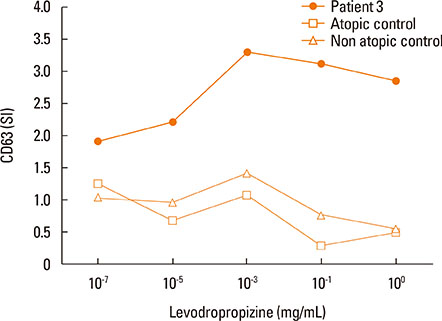Allergy Asthma Immunol Res.
2017 May;9(3):278-280. 10.4168/aair.2017.9.3.278.
Levodropropizine-Induced Anaphylaxis: Case Series and Literature Review
- Affiliations
-
- 1Division of Pulmonary, Allergy, and Critical Care Medicine, Department of Medicine, Hallym University Sacred Heart Hospital, Hallym University College of Medicine, Anyang, Korea. luxjhee@gmail.com
- 2Division of Pulmonary, Allergy, and Critical Care Medicine, Department of Medicine, Hallym University Dongtan Sacred Heart Hospital, Hallym University College of Medicine, Hwaseong, Korea.
- KMID: 2371729
- DOI: http://doi.org/10.4168/aair.2017.9.3.278
Abstract
- Levodropropizine is commonly used as an antitussive drug for acute and chronic cough. It is a non-opioid agent with peripheral antitussive action via the modulation of sensory neuropeptide levels in the airways. Thus, levodropropizine has a more tolerable profile than opioid antitussives. However, we experienced 3 cases of levodropropizine-induced anaphylaxis. Three patients commonly presented with generalized urticaria, dyspnea, and collapse after taking cold medication including levodropropizine. To find out the culprit drug, we performed skin tests, oral provocation tests (OPTs), and basophil activation tests (BATs). Two patients were confirmed as having levodropropizine-induced anaphylaxis by OPTs, and one of them showed positive to skin prick tests (SPTs). The other patient was confirmed by skin tests and BATs. When we analyzed pharmacovigilance data related to levodropropizine collected for 5 years, most cases (78.9%) had allergic reactions, such as rash, urticaria, angioedema, and anaphylaxis. Therefore, physicians should consider that levodropropizine can be a culprit drug, when anaphylaxis occurs after taking anti-cough or common cold medication.
MeSH Terms
Figure
Cited by 1 articles
-
An Ofloxacin-Induced Anaphylaxis through an IgG4-Mediated but Not IgE-Mediated Basophil Activation Mechanism
Ji Hye Kim, Dae-Hong Seo, Ga-Young Ban, Eun-Mi Yang, Yoo Seob Shin, Young-Min Ye, Hae-Sim Park
Korean J Crit Care Med. 2017;32(3):302-305. doi: 10.4266/kjccm.2017.00108.
Reference
-
1. De Blasio F, Virchow JC, Polverino M, Zanasi A, Behrakis PK, Kilinç G, et al. Cough management: a practical approach. Cough. 2011; 7:7.2. Zanasi A, Lanata L, Fontana G, Saibene F, Dicpinigaitis P, De Blasio F. Levodropropizine for treating cough in adult and children: a meta-analysis of published studies. Multidiscip Respir Med. 2015; 10:19.3. Luporini G, Barni S, Marchi E, Daffonchio L. Efficacy and safety of levodropropizine and dihydrocodeine on nonproductive cough in primary and metastatic lung cancer. Eur Respir J. 1998; 12:97–101.4. Kim SY, Kim JH, Jang YS, Choi JH, Park S, Hwang YI, et al. The basophil activation test is safe and useful for confirming drug-induced anaphylaxis. Allergy Asthma Immunol Res. 2016; 8:541–544.5. Baldo BA. IgE and drug allergy: antibody recognition of ‘small’ molecules of widely varying structures and activities. Antibodies (Basel). 2014; 3:56–91.6. Ye YM, Kim MK, Kang HR, Kim TB, Sohn SW, Koh YI, et al. Predictors of the severity and serious outcomes of anaphylaxis in Korean adults: a multicenter retrospective case study. Allergy Asthma Immunol Res. 2015; 7:22–29.7. Hur GY, Lee SY, Shim JJ, Park HS, Kang KH. An anaphylactic reaction caused by levodropropizine. Allergy. 2010; 65:409–410.8. Yoon K, Kim SH, Ahn Y. A case of levodropropizine-induced anaphylaxis. Korean J Asthma Allergy Clin Immunol. 2011; 31:219–222.9. Park KH, Yun IS, Choi SY, Lee JH, Hong CS, Park JW. A case of immunoglobulin E mediated anaphylaxis to levodropropizine. Yonsei Med J. 2013; 54:262–264.
- Full Text Links
- Actions
-
Cited
- CITED
-
- Close
- Share
- Similar articles
-
- A Case of Levodropropizine-induced Anaphylaxis
- A Case of Immunoglobulin E Mediated Anaphylaxis to Levodropropizine
- Food allergies and food-induced anaphylaxis: role of cofactors
- A Case of Rifampicin-induced Acute Renal Failure and Anaphylaxis
- Anaphylaxis induced by sugammadex and sugammadex-rocuronium complex -a case report-


